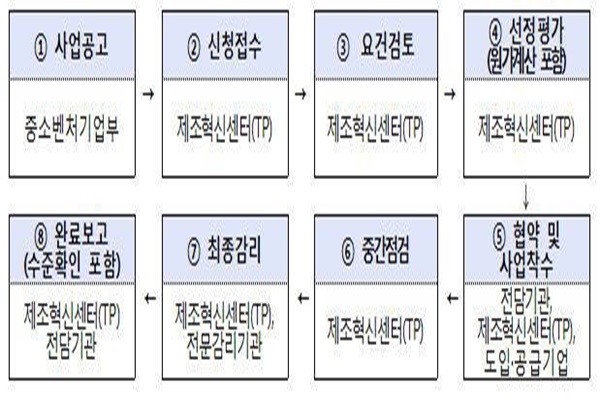Labor friendly Smart Factories that are expected to promote innovation within job sites are expected to be constructed by South Korean Government. Not only do these factories improve production efficiency, but they also focus on improving working conditions for laborers.
It is expected that these factories will assist labor industry and economic industry to find new ways together as they embrace changes that are expected to take place within employment environment during Industry 4.0. South Korean Government is also going to increase number of ‘pilot factories’ that will play a role of a model house to promote innovation within manufacturing industry and workplace.
Ministry of SMEs and Startups made a public announcement on ‘2019 ICT Convergence Smart Factory Expansion Project’ on the 12th. In 2019, it is going to invest $305 million (342.8 billion KRW), which is 2.6 times more than that of last year, to construct 4,000 Smart Factories.
Smart Factory is an intelligent factory that analyzes and utilizes data from manufacturing industry. It is receiving spotlight as a necessary means to innovate manufacturing industry during Industry 4.0. Companies that utilize Smart Factories improve their production by 30% and reduce defect rate, production cost, and deadline for delivery by 43.5%, 14.9%, and 15.5% respectively.
South Korean Government is currently pushing for a step-by-step process annually in order to have 30,000 Smart Factories by 2022. Its goal is to set up 2,800 Smart Factories within itself and 1,200 Smart Factories within private companies.
In order to have small and medium companies to establish Smart Factories properly, MSS increased an upper limit for financial support for new factories and old factories to $89,000 (100 million KRW) and $133,000 (150 million KRW) respectively.
It also simplified procedures for application and selection to support companies to set up Smart Factories faster. Selection period, which used to take 5 weeks, now only takes 2 weeks.
Private and Public Joint Smart Factory Promotion Group that was transferred to MSS last year is now going to be combined into Korea Technology and Information Promotion Agency for SMEs. In addition, MSS is going to set up manufacturing innovation centers at 19 Techno Parks in South Korea to rework its system for selecting companies with different regions at the center.

MSS is planning to have 25 pilot factories with industrial complexes at the center. Out of these 25, 5 of them will be labor friendly pilot factories and they will be linked to manufacturing innovation support projects that utilize robots. Companies that are selected for pilot factory project will receive up to $267,000 (300 million KRW) of financial support. If they are linked to manufacturing innovation support projects that utilize robots, they will receive up to $445,000 (600 million KRW).
Labor friendly Smart Factory has labor industry participate in a process of establishing a labor friendly Smart Factory and decide on work development and others. Labor and management will work together regarding education on new tasks, rearrangement of groups, and improvement in work environment.
“While Smart Factories in the past emphasized on production efficiency, labor friendly Smart Factories will focus on safe and convenient work environment for laborers based on intelligent technologies.” said Kim Woo-soon, who is the head of MSS’ Technical Innovation Policy Department. “Labor industry and economic industry are making new attempts for the first time for jobs in the future.”
Manufacturing innovation support project that utilizes robots will mainly support types of businesses such as metal processing industry, machinery industry, and chemical product industry that have high risks of industrial accidents to secure safety within manufacturing workplace.
MSS is also going to introduce ‘Smart Meister’ project that utilizes experts in Smart Factory. Samsung Electronics and Korea Federation of Small and Medium Business dispatched mentors to small and medium companies last year and benchmarked successful cases of helping small and medium companies with setting up Smart Factories. Mentors help with various technical difficulties regarding Smart Factory and teach manufacturing knowhow from large corporations.
MSS also prepared market solutions for companies that adopt Smart Factories. It is going to provide foundation for growth of these companies by giving them points whenever they want to supply their products to public agencies.
Small and medium companies that are wanting to participate in Smart Factory project can apply for it through Smart Factory Support Project’s comprehensive management system.
Staff Reporter Park, Jungeun | jepark@etnews.com